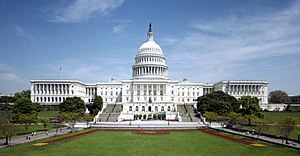 Image via Wikipedia
Image via WikipediaAs my summer rock tour on special education law continues, one theme is emerging: there have been big changes to §504 (through the ADA amendments by Congress.) The big question is how much these changes will affect the education of kids with disabilities.
At least three speakers, and many of the hallway conversations, during these conferences have directly addressed the changes to §504. One frequently heard comment is that the main dissatisfaction of the Congress with decisions involving §504 and the ADA in the employment context. Congress felt that the U. S. Supreme Court was interpreting the laws too narrowly and blocking many employees from going to court to be heard on the question of reasonableness of accommodations that they were requesting.
In particular Congress took issue with two lines of cases by the Supreme Court. One involved cases following Sutton v. United Airlines 527 US 471, 30 IDELR 681 (1999). Another involved cases following Toyota Manufacturing v. Williams 534 U.S. 184, 102 LRP 6137 (2002).
In the next part in this series, we will look at these cases and why Congress was upset.
At least three speakers, and many of the hallway conversations, during these conferences have directly addressed the changes to §504. One frequently heard comment is that the main dissatisfaction of the Congress with decisions involving §504 and the ADA in the employment context. Congress felt that the U. S. Supreme Court was interpreting the laws too narrowly and blocking many employees from going to court to be heard on the question of reasonableness of accommodations that they were requesting.
In particular Congress took issue with two lines of cases by the Supreme Court. One involved cases following Sutton v. United Airlines 527 US 471, 30 IDELR 681 (1999). Another involved cases following Toyota Manufacturing v. Williams 534 U.S. 184, 102 LRP 6137 (2002).
In the next part in this series, we will look at these cases and why Congress was upset.
